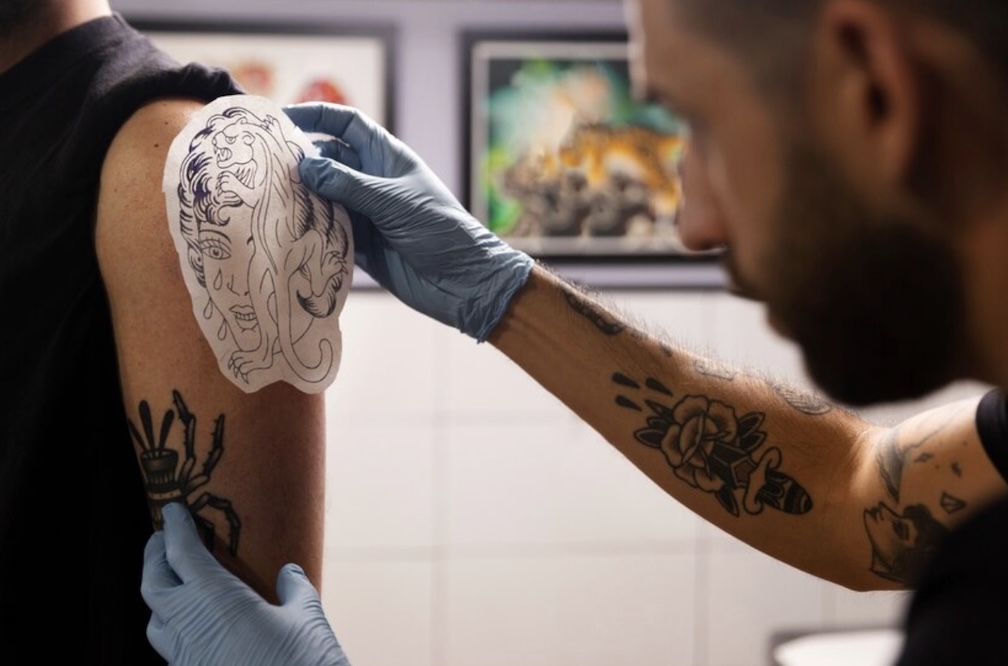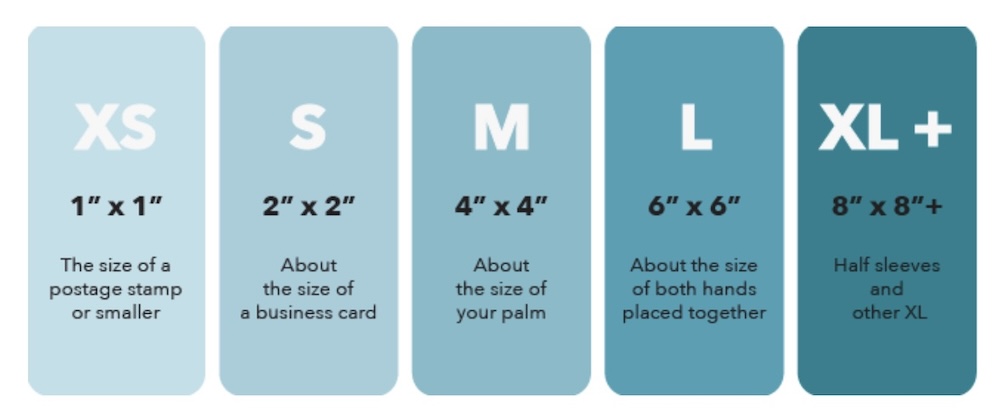Ultimate Tattoo Size Chart Guide: Choosing the Perfect Dimensions for Your New Ink
- Written by Daily Bulletin

A tattoo size chart is a reference tool used in the tattoo industry to provide visual examples and dimensions of different tattoo sizes. It aids both artists and clients in determining the appropriate size for tattoo designs.
Importance of Selecting the Right Dimensions for Your Tattoo
Choosing the right dimensions for your tattoo is vital. It ensures the design fits perfectly on the chosen body portion while maintaining its aesthetic appeal. Referencing the size chart for tattoos is essential to avoid such issues. Poorly sized tattoos may distort, reducing their overall quality and visual attractiveness.
Understanding Tattoos and sizes
Categories of Tattoos Based on Sizes
Tattoos vary in size and can be classified into three main categories: small, medium, and large. Small tattoos are usually minimalistic and subtle; medium tattoos cover a slightly larger area; and large tattoos often represent intricate, detailed designs or murals.
How Tattoo Sizes are Measured?
Tattoo sizes are primarily measured in inches, using length and width dimensions. Custom tattoos can be any size, but standard designs often fall between two and four inches in diameter.
Popular Tattoo Dimensions and Their Meanings
Micro or Tiny Tattoos
Micro or tiny tattoos are modern body art trends popular among millennials. They are discreet, delicate, and designed with keen precision. They act as a very personal symbolic expression, easily hidden owing to their minute size.
Small Tattoos
Small tattoos can be delicate and unassuming, yet significant. Perfect for first-timers or those who prefer subtlety, they are often symbolic, representing personal meanings or stories. Their appeal lies in their minimalistic and easily concealable nature.
Medium Tattoos
Medium tattoos offer a perfect balance between minimalistic and large, intricate designs. By providing enough space for creativity, they allow an impressive display of artwork without overwhelming the body's natural aesthetics.
Large Tattoos
Large tattoos are a bold form of self-expression, often covering significant portions of the body. They require considerable time, resources, and commitment. Every detail and colour vividly showcases the individual's personality, beliefs, or even personal narrative.
Extra-Large Tattoos
Extra-large tattoos are bold, personal expressions of individualism. They occupy large areas of the body, showcasing an intricate artistry that demands attention. Such tattoos often symbolise significant stories or beliefs about the wearer.

Factors to Consider when Choosing a Tattoo Size
The Complexity and Details of the Design
The complexity and details of the design reveal tremendous effort and thoughtful deliberation. Each element forms a symphony of visual harmony, while subtleties showcase the designer's ingenuity, creating a captivating aesthetic appeal.
The Body Part You Want to Ink
I've always admired the delicacy of wrist tattoos. The idea of etching a small, meaningful design there remains attractive, serving as a constant, easily visible reminder of the belief or memory it represents.
Your Tolerance Level for Pain
As an individual, my tolerance level for pain is quite high. I have conditioned myself over the years to withstand discomfort, whether it be physical or mental. Still, I always respect my body's signals to avoid potential harm.
The Cost and Time it Takes to Create the Tattoo
Creating a tattoo involves significant time, effort, and skill, often taking 2–5 hours for small designs and potentially 15+ hours for larger pieces. The cost usually ranges from $100 to $500 per hour, depending on the artist's expertise.
The End Aesthetic You Aim to Achieve
My ultimate aesthetic goal is to create designs that mix vintage charm with modern simplicity, using natural materials and earthy color palettes, in a bid to evoke feelings of warmth, tranquility, and comfort in the observer.
Impact of Dimension on Tattoo Styles
Traditional Style
Traditional style encapsulates elegance and comfort, often characterized by classic details, symmetrical arrangements, and rich color schemes. It merges European sensibilities, antique furnishings, and layered décor to create warmth and familiarity.
Watercolor Style
The watercolour style is a unique and expressive form of art. It relies on translucent and ethereal paints, allowing for vivid hues and free-flowing strokes. This technique often captures the softness and unpredictability of nature.
Geometric Style
Geometric style is an artistic concept characterised by its use of lines, shapes, and mathematical precision. It focuses on structural simplicity, orderliness, and creating patterns or abstract designs, often seen in architecture, sculpture, and modern digital art.
Realism and Portraiture
Realism in portraiture captures individuals as they truly are, depicting realistic details, features, and expressions. It aims for accuracy, not idealism, resulting in a faithful and honest representation that captures the nuances of the human condition.
Tribal Style
Tribal style mainly refers to handcrafted designs inspired by indigenous cultures. This style often incorporates natural and earthy elements, bold geometric patterns, intricate beadwork, and symbolic motifs, showcasing the unique heritage and traditions of various tribes.
The Role of Professional Tattoo Artists in Determining Tattoo Size
How a Professional Artist Can Advise on Size Based on Design
A professional artist, with their expertise, can guide on the optimal size for a design, taking into account factors such as the intended audience, display location, design complexity, and aesthetic impact. Their vast experience enables accurate size recommendations to enhance a design's potential.
How Does an Artist Determine the Size Based on Body Shape and Area?
An artist determines size based on body shape and area by observing and studying the subject thoroughly. They consider perspective, the relationship between different body parts, and the overall spatial balance to achieve accurate representation.
The Importance of Following the Given Size During the Tattoo Healing Process
Size-Dependent Healing Tips
Proper healing requires attention to body size, as diet, exercise, and sleep needs vary by individual. Larger bodies often need more nutrients and rest for recovery, while smaller ones may require more frequent, lighter meals and activity.
Aftercare Products for Different-Sized Tattoos
Aftercare products for tattoos vary depending on size and location. Small tattoos require basic skincare, like moisturisers and sunscreens. However, larger tattoos may necessitate specialised healing lotions, antibacterial soaps, or tattoo salves to promote proper healing and longevity.
Mistakes to Avoid when Deciding on Tattoo Dimensions
Underestimating the Size and Detail Requirements
Underestimating the size and detail requirements of any project can lead to significant problems later. This can cause delays, waste resources, and compromise the quality of the final output, resulting in dissatisfaction.
Not Considering the Body's Natural Contours
When designing clothing or furniture, ignoring the body's natural contours can lead to discomfort and a poor fit. Misalignment with the human body's shape can cause unnatural postures and potential health risks.
Size Chart for Tattoos FAQs
How Do I Know My Tattoo Size?
You can determine your tattoo size by considering the design you want and the area of your body it will cover. A consultation with your tattoo artist would provide a more accurate estimation.
What Size is a 3x3 Tattoo?
A 3x3 tattoo refers to a design that measures three inches by three inches. This size is relatively small, fitting well on areas like the wrist, ankle, or behind the ear. It's a popular choice for minimalist or simple designs.
How Big is a 500 Tattoo?
The size of a 500 tattoo depends on the design, complexity, and individual preference. It can range from a small, discreet size to a larger, statement piece. So, a solid dimension can't be given for a '500' tattoo.
How Small is a 2-inch Tattoo?
A 2-inch tattoo is relatively small, roughly comparable to the size of a postage stamp or a bottle cap. This compact size allows for discreet placement, making it a subtle and personal form of self-expression.




